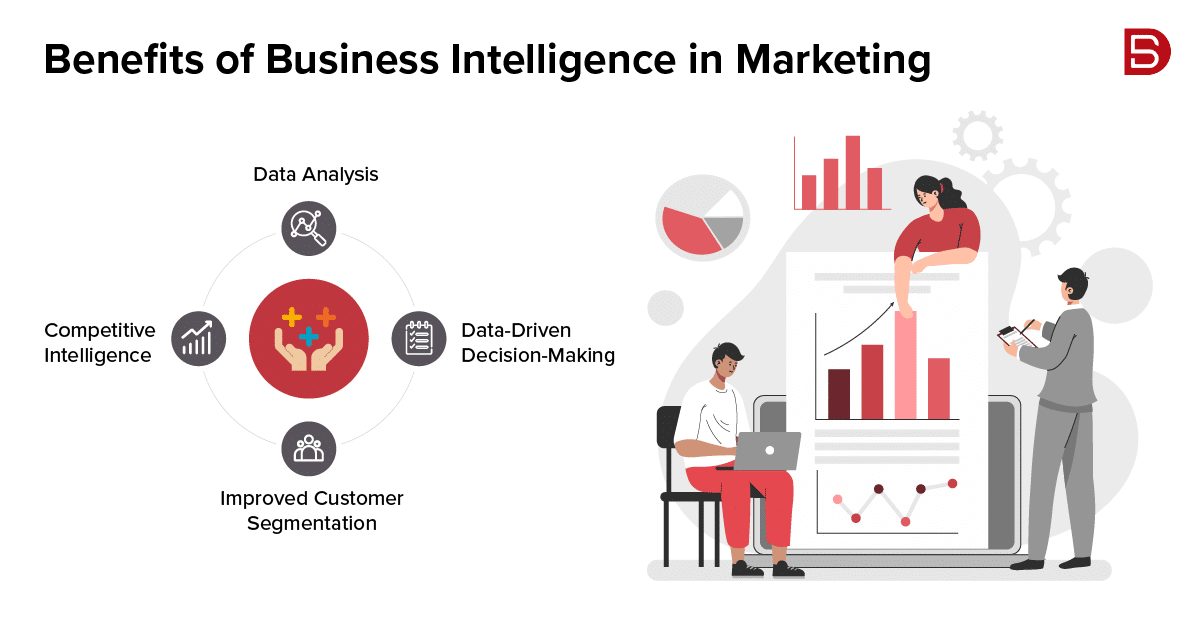The Evolution of Business Intelligence in Marketing
Business intelligence marketing, or, simply put, business intelligence in marketing, has undergone tremendous transformation since its inception. Much of its evolution or transformation can be attributed to the metamorphosis of technological developments in the space of marketing, the evolution of standard marketing practices, and the ever-changing customer behavior.
To have witnessed the evolution of business intelligence marketing has been awe-inspiring, especially when you consider the in-depth market trends, data-driven insights, and the unique vantage point it has given to businesses to get an edge over their competitors.
The evolution of business intelligence in marketing can be marked by the emergence of unique aspects of modern marketing, such as competitive intelligence, data analytics, and the dynamic business strategies that define current marketing practice in general. With its evolution, business intelligence in marketing has allowed marketers to decipher the complexities of unstructured data and consumer behavior, which seemed like an alien concept some time back.
This blog will delve into the synergetic relationship between market trends and business intelligence. This relationship has served incredibly well for modern marketers, allowing them to thrive in modern marketing by incorporating business intelligence as an integral part of their everyday marketing activities and creating marketing strategies that resonate well with the changing customer behavior with utmost precision.
We will cover areas like market trends, the primary role and critical components of business intelligence marketing in formulation of business strategies, the benefits and challenges surrounding business intelligence marketing, and, ultimately, what the future holds. So, let us get started.
The Coming Together of Market Trends and Business Intelligence in Marketing
As a marketer, market trends are both your current and your compass for navigating your ship toward the set goal or even dominating the market. However, as a marketeer, you need business intelligence to understand the direction, asset, or period towards which your market is tilting to make informed marketing strategies.
This is why the coming together of business intelligence and market trends has been such a valuable addition to the marketer’s arsenal. An excellent example of this is the increased use of social media platforms in modern marketing campaigns, both B2B and B2C. These social media platforms present a relatively fair picture of market trends by giving you a detailed insight into customer behavior, preferences, and market trends.
The real-time data gathered from these social media platforms enables businesses to make informed marketing strategic decisions, making it the cornerstone of modern business intelligence. By understanding the market trends and how they can sway, marketers can seamlessly navigate the marketing realm using the power of business intelligence.
It’s worth mentioning that, unlike any transitioning fad, market trends tend to stay longer and have a more profound impact on the market and marketing in general. In some cases, marketing trends have also been responsible for prolonged changes in customer behavior or technological development. An excellent example of that can be the increased use of video as a medium for marketing. Whether it’s the short-form video clips in the form of Instagram Reels or Tik-Toks or the long podcast or webinar format, every modern brand seems to have adapted it as an integral part of their marketing campaigns.
The rise of modern business intelligence tools and technologies has also enabled marketers to extract buyer intent, sentiment, or even buying patterns from the massive datasets of their organization. With their data visualization capabilities, these tools help marketers transform complex market trends into easy-to-interpret and understand graphics for advanced analytical use, such as identifying patterns and forecasting.
As a marketeer by, constantly monitoring the market trends and in-depth market research can help you navigate the competitive landscape with great ease and position your organization strategically ahead of your rivals.
Key Benefits and Challenges of Incorporating Business Intelligence in Marketing
While business intelligence in marketing has proven to be a transformative force for marketers, adopting business intelligence has yet to be smooth sailing for organizations. Let us look closely at some key benefits and challenges of incorporating business intelligence in marketing.
Benefits of Business Intelligence in Marketing
• Data Analysis
Business intelligence tools allow marketers to conduct in-depth data analysis. You can easily monitor market trends and analyze campaigns in real time for maximum ROI using advanced BI tools.
• Data-Driven Decision-Making
With business intelligence, the days of gut-based decision-making are behind us. With insights driven by deep data analysis, marketers can make informed decisions for precise targeting and more optimized campaigns.
• Improved Customer Segmentation
Business intelligence tools allow marketers to analyze customer data with absolute granularity, facilitating more focused and detailed customer segmentation. This will enable them to tailor their market strategies for maximum impact.
• Competitive Intelligence
Business intelligence provides a deeper insight into competitors’ strategies, strengths, and weaknesses. This allows businesses to refine their strategy and gain a competitive edge.
Challenge of Business Intelligence in Marketing
There are different methods for CDI, and the right one for your business depends on the amount of data, database organization, and the platforms used. Here are three primary ways to integrate data records:
• Data Safety and Privacy
With businesses’ growing collection of customer data, there is an equally growing concern regarding data safety and privacy among customers. This is why, as a business, you need stringent measures to ensure complete compliance with regulations and robust cybersecurity measures to safeguard sensitive information.
• Integration With Legacy Systems
For all their advanced capabilities, most modern business intelligence tools still need help integrating with existing systems and workflows. So, when adapting any business intelligence tool, you must ensure that the tool you plan to adopt is compatible with your existing system and workflow.
• Training and Upskilling
To make the most out of these business intelligence tools, you need specific skills and expertise that may be absent in your organization. Thus, it would help if you had a comprehensive upskilling and training program to familiarize your existing resources with these tools.
The Future for Business Intelligence & Marketing in General
With the vast technological advancements shaping the marketing and business landscape in general, it is tough to put your finger on one market trend or technology that will dominate the landscape for the foreseeable future.
However, with the sudden rise in the use of artificial intelligence (AI) and machine learning (ML) in all walks of life, a convergence of business intelligence with these technologies seems like a certainty. It will transform the entire marketing landscape and be a massive leap in predictive analytics, automated insights generation, and AI-driven decision-making fronts.
Other more certain developments include the integration of business intelligence with IoT Data, augmented analytics, and advanced data visualization techniques. However, with the growing concern over data privacy and ethical use, the future of business intelligence and marketing in general will also emphasize it.
With all that, as we navigate the ever-evolving landscape of business intelligence and marketing, we will continue to see new market trends emerge and shape the industry as we know it. If you want data-driven market intelligence to position your business, write to us at marketing@datamaticsbpm.com, and our research experts will contact you.
 Select an element to maximize. Press ESC to cancel.
Select an element to maximize. Press ESC to cancel. Select an element to maximize. Press ESC to cancel.
Select an element to maximize. Press ESC to cancel.
Somnath Banerjee



